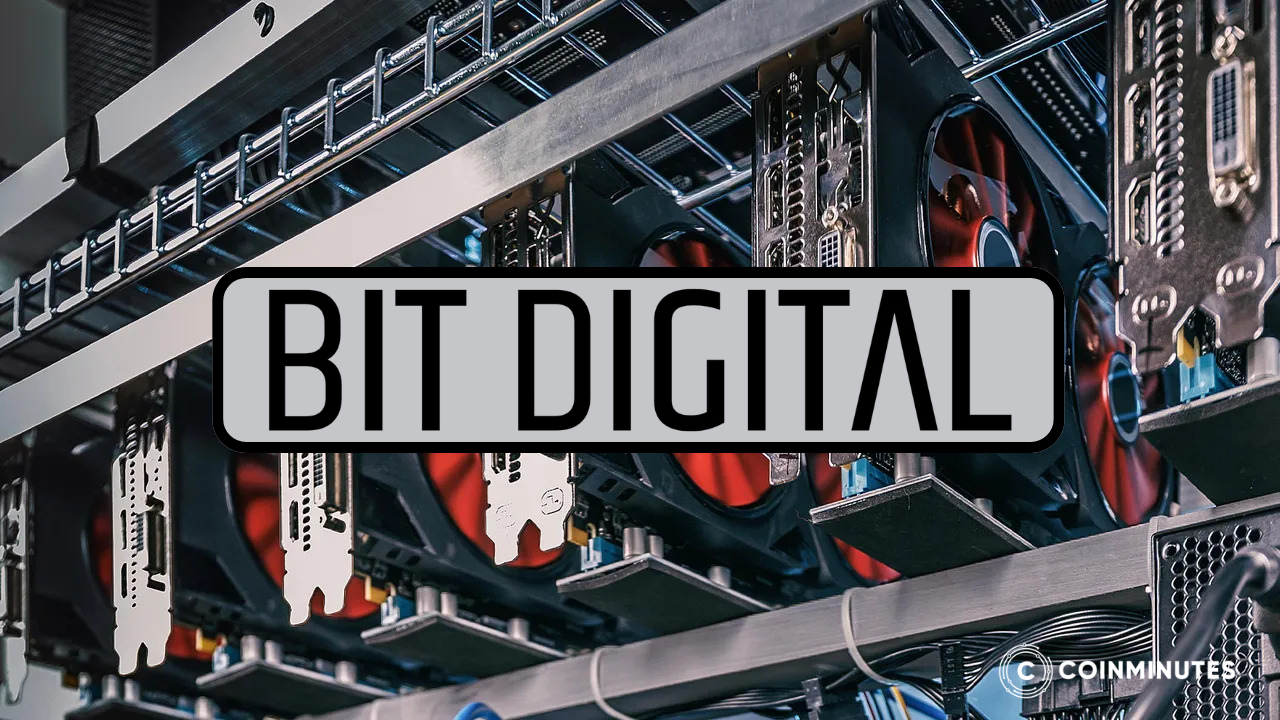Bit Digital Raises $150 Million to Pivot from Bitcoin Mining to Ethereum Staking

Bitcoin mining is dying before our eyes.
In a move that's sending aftershocks through the entire crypto industry, mining giant Bit Digital has raised $150 million to abandon Bitcoin mining entirely. Their radical new mission? Becoming an Ethereum staking powerhouse overnight.
This isn't just corporate restructuring. It's a funeral for Bitcoin's founding technology.
The question isn't whether other miners will follow suit—it's how quickly they'll jump ship.
Is Bitcoin Mining a Financial Death Trap?
Bitcoin mining has transformed from gold rush to quicksand. Fast.
The numbers tell a brutal story.
According to confidential industry reports obtained by Coin Minutes, production costs for Bitcoin mining operations rocketed past $70,000 per BTC in Q2 2025. That's a staggering 35% increase in just six months.
Why?
Network difficulty has reached dizzying heights. Miners now solve increasingly complex puzzles for the same reward. But that's just one piece of this financial nightmare.
Electricity costs have become mining's executioner. Terawulf, one of North America's largest mining operations, watched their Q1 electricity expenses nearly double year-over-year to $0.081 per kilowatt-hour.
Think about what that means for your mining economics. Yesterday's profit becomes today's loss with no warning.
Bit Digital's personal crisis accelerated when key hosting partnerships collapsed late last year. Their Q1 2025 mining production crashed to just 83.3 BTC—a shocking 64% drop from their previous 400+ BTC quarters.
"The economics no longer make sense," admitted Sam Tabar, Bit Digital's CEO, during a recent earnings call. "We're facing an existential choice: adapt or die."
How Does Ethereum Staking Actually Work?
So what's this magical "staking" system that convinced a Bitcoin mining veteran to bet $150 million?
Imagine Bitcoin mining's efficient, responsible cousin.
Instead of filling warehouses with heat-generating computers that devour electricity like a hungry teenager empties a refrigerator, Ethereum validators simply lock up ETH as collateral to secure the network. The system—called "proof-of-stake"—works fundamentally differently from Bitcoin's energy-intensive "proof-of-work" mining.
"It's like comparing a Tesla to a coal-powered locomotive," explains blockchain researcher David Chen. "Both transport you, but one does it without consuming the planet's resources."
What do you get for staking? A steady stream of new ETH tokens flows directly into your wallet. No electricity bills. No hardware upgrades. No maintenance headaches.
At current rates, Ethereum staking generates approximately 2.987% annually. For traditional finance executives used to anemic interest rates, this yield is nirvana. For Bit Digital, it translates to roughly $298,700 in annual income for every 100,000 ETH staked.

The advantages demolish traditional mining economics:
-
Energy costs? Nearly zero. Staking uses 99.95% less electricity than mining.
-
Hardware investments? Eliminated. No more million-dollar purchases of specialized equipment with the lifespan of a mayfly.
-
Revenue predictability? Rock solid. Unlike mining's chaotic boom-bust cycles, staking rewards remain relatively stable regardless of market swings.
Bit Digital isn't merely testing these waters. They've cannon-balled into the deep end.
According to blockchain analytics firm Nansen, the company converted its entire BTC treasury to ETH in early July, accumulating 100,603 ETH worth approximately $254 million.
That instantly crowns them as the second-largest corporate Ethereum holder globally, behind only Coinbase.
Why Are Corporations Suddenly Hoarding Ethereum?
Bit Digital's dramatic strategy shift reflects a broader corporate migration toward Ethereum that's gathering momentum.
Major companies are increasingly stockpiling ETH:
-
Coinbase holds approximately 115,700 ETH valued at $341 million as operational reserves.
-
Exodus maintains roughly 2,550 ETH worth $7.5 million as part of its diversified crypto holdings.
-
Even BlackRock—the world's largest asset manager with $10 trillion under management—recently shifted $561 million from its Bitcoin ETF to Ethereum products.
But why this sudden corporate flight to Ethereum?
It's not just about yield. It's about utility.
"Ethereum has the ability to rewrite the entire financial system," Tabar declared in a recent interview. "We intend to become the preeminent ETH holding company in the world."
Unlike Bitcoin's singular store-of-value narrative, Ethereum's programmability unlocks integration with thousands of decentralized finance protocols. This creates yield opportunities that simply don't exist in Bitcoin's ecosystem.
And Ethereum's supply mechanics (net inflation: 0.7%) help preserve value better than competitors like Solana (4.5% inflation).
For corporations seeking both yield and growth potential, Ethereum increasingly looks like the optimal digital asset.
But make no mistake—this transition carries enormous risks.
What Could Go Wrong with Bit Digital's All-In Bet?
Let's be brutally honest. Bit Digital's pivot carries potentially existential risks.
Have you seen the dilution numbers? They're jaw-dropping.
The $150 million offering created 75 million new shares, diluting existing shareholders by a crushing 58.6% overnight. BTBT shares predictably plunged 15% on announcement day.
Timing questions hover like vultures. Bit Digital's previous BTC-to-ETH conversions happened near the 0.048 ETH/BTC ratio—but that ratio subsequently plummeted to 0.023.
Did they convert at the worst possible time? Possibly.
The staking landscape itself harbors long-term dangers. As institutional capital floods into Ethereum staking, rewards will inevitably compress.
Currently, roughly 35 million ETH (28% of total supply) is staked. Analysts project this could reach 40% by year-end, potentially driving yields below 2%.
"They're making a massive directional bet on Ethereum outperforming Bitcoin," explains crypto analyst Maya Rodriguez. "If that bet goes wrong, there's no easy way back."
For shareholders, the company they invested in has morphed beyond recognition. What was once a pure Bitcoin miner now exists as an Ethereum treasury vehicle with a computing side hustle.
Is it still the same company? You decide.
Could WhiteFiber's IPO Be the Real Game-Changer?
Buried in the announcement's fine print was a bombshell many missed: Bit Digital has filed for an initial public offering for WhiteFiber Inc., its wholly-owned high-performance computing subsidiary.
This isn't rearranging deck chairs on a sinking ship. It's building an entirely new vessel.
WhiteFiber specializes in advanced computing infrastructure potentially positioned to support the Ethereum layer-2 ecosystem or AI applications. By spinning off this subsidiary while pivoting to Ethereum staking, Bit Digital is transforming into a crypto-focused technology holding company.
"The WhiteFiber IPO creates fascinating synergies," notes blockchain consultant Alex Chen. "Their computing infrastructure could directly support the Ethereum ecosystem they're invested in."
Think about the strategic elegance if executed properly: an Ethereum treasury generating passive yield while a related computing business provides services to that very ecosystem. It's like owning both the toll road and the vehicles that use it.
But can they execute this complex transformation without stumbling? That remains the billion-dollar question.
This dual-track strategy offers a potential lifeline for other struggling miners facing similar economic pressures. Yet following Bit Digital's blueprint requires extraordinary execution capabilities.
Are other miners equipped for such a dramatic pivot?
Will Traditional Bitcoin Mining Survive?
Bit Digital's radical transformation signals a potential extinction-level event for traditional mining operations.
As Ethereum staking democratizes network participation and generates real yield with minimal overhead, traditional mining's energy intensity and capital requirements look increasingly obsolete.
The contrast is stark: one model consumes massive resources with diminishing returns, while the other generates passive income with virtually no ongoing costs.
Which would you choose?
But this doesn't spell doom for Bitcoin itself. Rather, it suggests the economics of producing new Bitcoin may fundamentally transform.
And this shift coincides with growing institutional momentum behind Ethereum. New regulations like the GENIUS Act improve crypto's institutional framework, while growing retail adoption—24% of Americans now own crypto—creates demand for yield-generating products.
For struggling miners watching Bit Digital's move, the message couldn't be clearer. When an established player abandons mining entirely, it forces the entire sector to question its business model.
Will we witness a wave of miners following Bit Digital's lead?
The economics make a compelling case. If Ethereum reaches projected targets of $12,000-$15,000 by 2025, Bit Digital's billion-dollar bet could redefine corporate crypto strategy completely.
For an industry built on disruption, this may be the most disruptive move yet. The future of crypto mining might not involve mining at all.
And that would rewrite crypto's entire industrial landscape forever.
 English
English
 Vietnamese
Vietnamese











